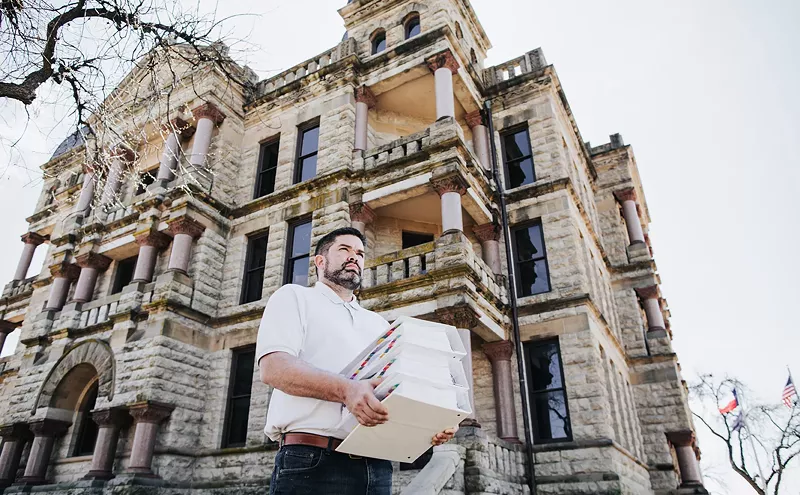Some of the changes the county has made: creating the pretrial division in June, implementing a new risk assessment tool to identify these people and offering low-cost bonds to help them get out of jail.
“At the end of the day, these individuals come in charged with a crime, but they are innocent until proven guilty,” said Duane Steele, deputy director of pretrial services. “We as pretrial officers believe that.”
Dallas County magistrates who set bail amounts seem to have missed the memo.
A federal lawsuit filed Friday against Dallas County alleges that indigent people are still sitting in jail on bail that they can’t afford even after county officials made changes to alleviate this problem. The American Civil Liberties Union, the ACLU of Texas, the Civil Rights Corps and the Texas Fair Defense Project filed the class-action suit against the county, the sheriff and the county's judges, claiming that Dallas County's bail system violates defendants' constitutional rights.
“Dallas and Houston both have a money-based pretrial system,” said lead plaintiffs' attorney Elizabeth Rossi. “[This system] depends exclusively how much money they have in their pocket, and both of the systems are disproportionately detaining impoverished people and people of color. ... Not only does it affect the outcome of the case, but it also devastated people's lives.”
The lawsuit lists six plaintiffs — Shannon Daves, Shakena Waltson, Erriyah Banks, Destinee Tovar, Patroba Michieka and James Thomspon — who all claim they were brought before a magistrate with a group of people and never asked if they could afford bail.
"The systems are disproportionately detaining impoverished people and people of color. ... Not only does it affect the outcome of the case, but it also devastated people's lives.” – plaintiffs' attorney Elizabeth Rossi
tweet this
“No one ever asked me if I could afford to pay that amount of money, and each hearing lasted about a minute,” Banks pointed out in her Jan. 21 affidavit. “I have some health issues and need certain medication. I also have to have a special diet. I’ve asked the jail for these, but am not receiving them even though my health could suffer.” Banks was arrested Jan. 19 on unspecified felony charges.
Daves, a transgender woman, has been kept in solitary confinement in the men's jail since her arrest Jan. 17 on a misdemeanor charge because she couldn’t afford to pay $500 bail. The rest of the plaintiffs were all arrested in the past week for misdemeanor or felony offenses and kept in jail because they can’t afford to pay the bail money, according to the lawsuit.
The defendants include Dallas County Sheriff Marian Brown, six magistrates, 17 criminal district court judges and 11 county criminal court judges.
“The named plaintiffs’ money bail amounts are being required pursuant to Dallas County’s schedule of secured monetary bail amounts and without any inquiry into their ability to pay or any consideration of or findings concerning alternative conditions,” the lawsuit says. “Because they are impoverished and cannot afford the payment required by the County for their release, the plaintiffs — who are presumptively innocent — will be detained in Dallas County jail cells for days or weeks until they are finally brought to court on the ‘jail chain.’”
The lawsuit points out that Daves and Tovar, both arrested on misdemeanor charges, must wait four to 10 days before they are brought to court (with other indigent defendants) for a first appearance, and felony defendants like Waltson, Banks, Michieka and Thompson must wait two to three weeks before they make an appearance if they waive indictment. If they don’t waive it, they have to wait two to three months.
"First appearance is the first even theoretical opportunity for an arrestee to speak to a judge who can consider ability to pay or challenge conditions of release. However, in practice, even this 'appearance' is not a true opportunity to raise ability to pay and challenge conditions of release, because arrestees are not brought into the courtroom unless they are pleading guilty," the lawsuit claims.
The bail amounts are not individualized but are set according to a “bail schedule,” a list of monetary amounts that correspond with the offense charged. The state allows the county to permit release based on nonfinancial conditions or unsecured bail and to issue citations for misdemeanor offenses such as marijuana possession instead of making arrests, according to the lawsuit.
The lawsuit also points out that Dallas County Jail books 182 new arrestees daily, and the Dallas County Sheriff’s Office has closed the magistrate hearings to the public and refused a request by attorneys who filed a lawsuit to observe them.
Another problem involves appointing counsel for indigent defendants. The county still refuses — as a matter of policy — to computerize or automate the process for appointing counsel and uses a paper system that delays this appointment from several days to weeks at a time.
Public defenders' overwhelming caseloads also don't help, nor does the lack of oversight or enforcement by the county to make sure appointed attorneys are contacting new clients within 24 hours of appointment.
A person can’t challenge conditions of release before charges are filed, according to the lawsuit. Once a public defender files a bond-reduction motion, it takes days to weeks before the hearing occurs. The presiding judge of the misdemeanor courts refers to it as “the black hole” because nothing can happen until the hearing, so the person charged ends up languishing in jail and possibly losing his or her only financial means of paying bail: a job.“Because they are impoverished and cannot afford the payment required by the County for their release, the plaintiffs ... will be detained in Dallas County jail cells for days or weeks until they are finally brought to court.’” – federal lawsuit
tweet this
Dallas County’s policies allow the District Attorney’s Office four business days to file charges in misdemeanor cases and five to 10 business days to file most felony charges, but this system exacerbates the problem.
Even when a case is filed, a person could end up waiting even longer to be released. For example, as of Jan. 21, two individuals who were arrested Jan. 9, one for possession of less than 2 ounces of marijuana and the other for trespassing, were still waiting in jail because they couldn’t pay the $500 bail amount. Neither has an attorney or has been taken to court.
Rossi told the Observer that this kind of situation breeds guilty pleas and plea deals at this first appearance because of poverty. “So many of these folks are living with unstable housing and under employment that a few days in jail can destabilize their life and take [up to] a year or two [to restabilize it],” she said. “Our constitutional system is set up that you are presumed innocent until the state proves that you are guilty.”
And most misdemeanor and low-level felony arrestees plead guilty on their first appearances. According to the lawsuit, only about 4.6 percent of people booked into jail were released on pretrial-release bonds in 2015, and that number dropped to about 3.3 percent in 2016.
Rossi filed a similar lawsuit in Harris County and won in 2017. A federal judge ruled Harris County's bail system was unconstitutional and ordered the free release of all indignant defendants facing misdemeanor charges within 24 hours.
The Observer reached out to Charlene Randolph, the director of Dallas County Criminal Justice Department, for comment, but she wasn’t sure what the county would allow her to say and asked us to send our questions so she could send them up the chain for approval. We’re still waiting to hear back.
Steele, the deputy director of pretrial services, told the Observer in early January that the new pretrial division has helped to keep people from jail. “Jail pop in Dallas County is actually lower than it has ever been,” he said.
But Rossi points out in the lawsuit that 70 percent of those people “have not been convicted of a crime. Instead, they languish in jail because they cannot afford to pay the amount of money required for their release.”
Rossi said that part of the problem with the surety bond system — in which private bond companies collect fees to secure a defendant's release — that many counties like Dallas have embraced seems to have occurred when corporate interests were introduced. She said for-profit bond companies cause a tremendous transfer of wealth from the poorest to the private industry.
The ACLU recently issued an explanation of how the bail bond industry exploits poor people and showed that millions of dollars are coming from ZIP codes where people are receiving the most government assistance, Rossi said.
Once someone bonds out of jail and proves his or her innocence later in court, the money given to the bond company to get out of jail isn’t returned. It’s nonrefundable.
Normally, when someone who uses a commercial bond to get out of jail doesn’t show up to a court hearing, the bond company is on the hook to pay the full bail amount. But lobbyists for bond companies have gotten legislators to grant them a six- to nine-month grace period before they have to pay the court.
Although Dallas County reports that 25 percent to 35 percent of people who bond out fail to appear for their court hearings, the vast majority of these people aren’t jumping on a bus or train to get out of town. They simply can’t make it to court because they don’t have child care or a ride. Once they’re captured, they’re faced with even more penalties.
“It’s just a ransom,” Rossi said.













